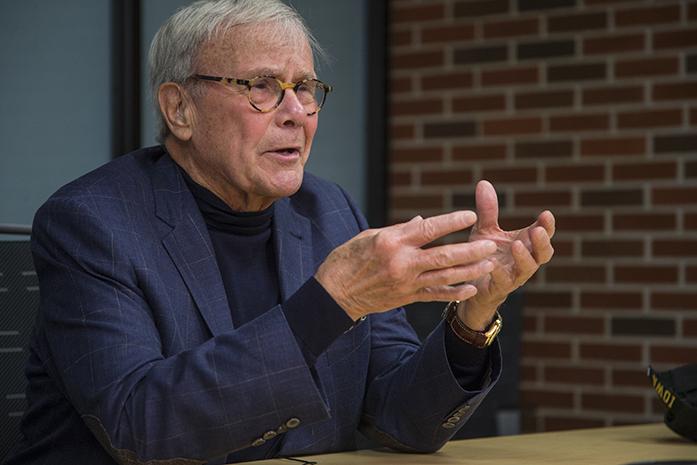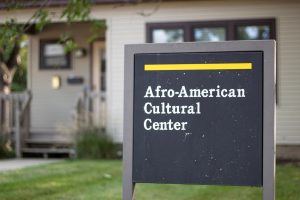Retired TV journalist Tom Brokaw recalls 9/11, the day America realized its vulnerability
In an interview with The Daily Iowan, Brokaw described his experience on 9/11, when he broadcasted the news of the event for over 12 hours.
Daily Iowan reporters interview NBC special news correspondent Tom Brokaw, who attended the University of Iowa as a freshman, in the Main Library on Friday, Nov. 11, 2016. Brokaw donated his papers and memorable to the University of Iowa Library from his 50 years at NBC. (The Daily Iowan/Joseph Cress)
September 12, 2021
On the day of 9/11, Tom Brokaw was on air live for more than 12 straight hours.
Americans nationwide remember his coverage on NBC, as much of the country had their eyes fixed on news channels from morning to night. Brokaw worked through the day to inform the nation of exactly what was happening in New York City, and even more ambitiously, what to expect next, even as so much remained unknown.
Brokaw, now retired and living in Montana, still remembers the day vividly, he said in an interview with The Daily Iowan.
The journalist and one-year University of Iowa alum was called into work and had to leave a yoga class his wife had set up for him to grab a suit — and then a cab.
On the way to the office, he heard over the radio that a plane had flown low over lower Manhattan and hit one of the World Trade Center towers. While he didn’t understand yet what was going on, he knew immediately it had to be something serious. He called his wife, who was away in Montana.
“‘You’d better get up and pay attention,’” he told her. “‘I don’t know when we’ll be able to talk again.’”
While on air, information poured in. Brokaw had to sort out fact from fiction in order to accurately inform the public of what was happening. Even though there was no social media, and the internet was still in its infancy, rumors and conspiracies still swirled quickly.
What Brokaw did recognize as fact after seeing the damage the towers had taken, however, is that the structures would not remain standing for long.
“‘These towers are not invulnerable, it’s likely that they’ll come down,’” he recalled saying on air. “As soon as I said that I thought, ‘My God, I shouldn’t have gone that far.’ I grew up around construction so I was confident I was right.”
Moments later, the towers crumbled before the nation’s eyes.
“You could just feel the air sucked out of America,” Brokaw said.
As a TV journalist and senior reporter, Brokaw said not much surprised him at that point in time. He was familiar with threats to America from the Middle East, and whenever tragedy struck the nation, he went into autopilot to deliver the news.
But 9/11 impacted America unlike anything else he’d seen before. And the way it shaped the country, even two decades after, tells a story of a nation realizing its vulnerability for the first time, he said.
“People in the towers, firemen, people who were around there were attacked on a sunny day,” he said. “America’s innocence at that moment — America’s belief that it was invulnerable — disappeared.”
Brokaw returned to his apartment at midnight. He had just learned that his friend had died of lung cancer that same day. His wife was in another state. America, he believed at the time, was suddenly and inevitably at war. With the glow of fires from the tragedy still burning in the distance, he sat on his bed and cried, feeling angry, anxious, and alone.
The war he predicted occurred. American troops remained in Afghanistan until this year. At his home in Montana, Brokaw reflected on the ways America has changed and continued to see loss even years after 9/11 claimed nearly 3000 lives.
“The war that was started then has just now wound down, and think of all the lives of young Americans that have been lost fighting,” he said. “I think [9/11] will always be in bold print in any history of our time about how it changed us. How it changed almost everything you can imagine.”






